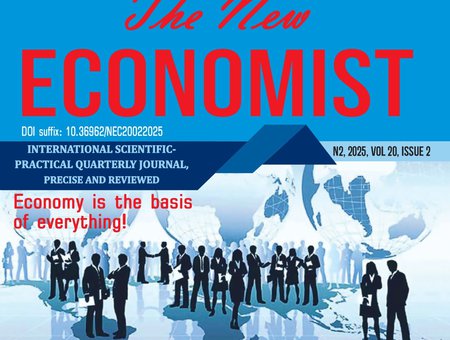Georgia’s Strategic Role in Eurasian Transport and Digital Logistics Transformation

Loid Karchava
Doctor of Business Administration, Associate Professor, Caucasus International University

Irakli Nanuashvili
Master of Law, Ministry of Defense of Georgia

Gia Zoidze
Doctor of Economics, Batumi Shota Rustaveli State University

Shota Veshapidze
Doctor of Economic Sciences, Associate Professor, Ivane Javakhishvili Tbilisi State University
Abstract
Georgia is an important element of the Middle Corridor, a trans-Caspian international transportation corridor that connects China and Europe via Central Asia and the South Caucasus. Its strategic location at the intersection of Europe and Asia makes it an important player in international transportation and logistics. As Georgia's logistics industry looks to further integrate into global supply chains, this strategic stance offers both enormous opportunity and difficult problems. By examining the institutional frameworks, policy efforts, and infrastructure that influence Georgia's performance in regional and global contexts, this paper investigates the country's present position in international transport logistics. The TRACECA (Transport Corridor Europe-Caucasus-Asia), the Baku-Tbilisi-Kars railway, and Georgia's Black Sea ports, notably Poti, Batumi, and Anaklia (proposed), are among the main logistical routes that travel through the country and are examined in this article. Georgia is positioned as a natural transit nation for cargo movements between the North and South as well as between the East and West thanks to these facilities. Georgia's full potential as a logistics center is, however, hampered by a number of issues. These include reliance on external political and economic variables, such Russian influence and regional wars, regulatory inefficiencies, limited cargo handling capacity, poor infrastructure in some areas, and geopolitical instability in the South Caucasus. Furthermore, Georgia is under further pressure to become more competitive due to competition from other routes, such as those via Russia, Iran, and sea channels. However, Georgia has benefited from new opportunities brought forth by the changing global logistics scene, which has been altered by the COVID-19 epidemic and the conflict between Russia and Ukraine. The Middle Corridor and Georgia's role within it have garnered fresh attention due to changing trade patterns and the growing interest of European and Asian entities in diversifying supply chains. Georgia can greatly improve its connectivity and logistical performance by investing in digitization, modernizing customs, and forming public-private infrastructure partnerships. A series of strategic growth directions for Georgia's logistics industry are suggested in the paper's conclusion. These consist of: (1) enhancing the integration of multimodal transportation; (2) investing in rail and port infrastructure; (3) enhancing cross-border logistics collaboration with neighboring nations; (4) bringing regulatory practices into compliance with EU standards; and (5) advancing Georgia as a hub for logistics and transportation through policies and international partnerships. Georgia can strengthen its position as a key hub in Eurasian logistics and a trustworthy transit partner in the global economy by implementing concerted policy initiatives and making focused investments.
References
- Abashishvili, G., & Liparteliani, S. (2021). Georgia’s transit potential – country’s competitive advantage. The New Economist, 16(2), 42–57. https://doi.org/10.36962/nec6102202142
- Abuselidze, G. (2021). Competitiveness analysis of the georgian transport and logistics system in the black sea region: challenges and perspectives. In International Conference on Computational Science and Its Applications (pp. 133-148). Cham: Springer International Publishing.
- Abuselidze, G., & Meladze, A. (2024). Innovative Customs System and its Impact on the Sustainability of the Transit Potential. European Journal of Sustainable Development, 13(1), 229-229.
- Agenda.ge. (2023). Gov’t approves 2023-2030 National Transport and Logistics Strategy, Action Plan.
- Albrecht, T., Baier, M. S., Gimpel, H., Meierhöfer, S., Röglinger, M., Schlüchtermann, J., & Will, L. (2024). Leveraging digital technologies in logistics 4.0: Insights on affordances from intralogistics processes. Information Systems Frontiers, 26(2), 755-774.
- Asian Development Bank. (2021). Georgia: Transport and Trade Facilitation Strategy. https://www.adb.org
- Barbaqadze, T., & Gegechkori, I. (2023). Renewable energy, transport and logistics, and digital transformation are key sectors for Georgia's economic growth. International Finance Corporation.
- Bedianashvili G. (2023). Macrosystemic challenges of uncertainty under the conditions of confrontational globalization. Bulletin of the Georgian National Academy of Sciences, 17, 2: 174-179. http://science.org.ge/bnas/vol-17-2.html
- Bedianashvili, G. (2014). Culture as an Institution in the Context of Socio-economic Development of Country and International Business. Ekonomisti, (6), 6-16.
- Caspian News. (2024). Baku-Tbilisi-Kars Railway Expansion Completed, Boosting Cargo Volume to 5 Million Tons.
- Civil Georgia. (2023). Ministry of Economy Clarifies the National Strategy for Transport and Logistics and Its Action Plan. https://civil.ge/archives/555990
- Christopher, M. (2016). Logistics & Supply Chain Management (5th ed.). Pearson.
- Enterprise IT World. (2025). RFID Technology – Digital transformation in Logistics Industry.
- Fortune Business Insights. (2025). Logistics Services (3PL & 4PL) Market Size....
- Gayialis, S. P., Kechagias, E. P., Deligianni, A., Konstantakopoulos, G. D., & Papadopoulos, G. A. (2022). Implementation Technologies of an Advanced Cloud-based System for Distribution Operations.
- Georgian Legislative Herald. (2022). Agreement between the Government of Georgia, the Government of the Republic of Azerbaijan and the Government of the Republic of Turkey on the preliminary exchange of data for the purpose of simplifying customs transit procedures within the framework of the Baku-Tbilisi-Kars railway project.
- Geostat. (2024). Georgia’s GDP Up by 7.5% in 2023. https://civil.ge/archives/588138
- Gereffi, G., & Fernandez-Stark, K. (2016). Global Value Chain Analysis: A Primer. Duke University.
- Goguadze, G. (2023). Georgia’s Strategic Role in the Middle Corridor.... Caucasus Journal of Transportation and Logistics, 4(2), 35–52.
- Grefen, P., Hofman, W., Dijkman, R., Veenstra, A., & Peters, S. (2018). An integrated view on the future of logistics and information technology.
- Ismailov, E., & Papava, V. (2009). The Central Caucasus – Problems of Geopolitical Economy.
- Karchava, L., Veshapidze, S., & Chiabrishvili, K. (2023). Economic perspective of establishing strategic partnership between China and Georgia. The New Economist, 18(3), 7-2.
- Karchava, L., Veshapidze, S., & Tsikelashvili, S. (2025). Georgia's Perspective in the Context of Developing Economic Relations between China and the European Union. The New Economist, 20(1), 8-23.
- Knemeyer, A. M., & Murphy, P. R. (2004). Evaluating the performance of third‐party logistics arrangements: a relationship marketing perspective. Journal of supply chain management, 40(4), 35-51.
- Kvanchilashvili, E. (2023). National Transport and Logistics Strategy of Georgia 2023–2030: Visions, Goals, Objectives, Risks. Business Media.
- Lomia, T., & Lomia, E. (2020). Economic and Political Support of the European Union to Georgia: Retrospective Analysis of the EU-Georgia Relations. Vallis Aurea, 6(1), 35-43.
- Lomia, E. (2020). The Evaluation of Russia's foreign policy towards Georgia following the ‘Rose Revolution’. Journal of Liberty and International affairs, 6(1), 112-128.
- Lomia, E. (2021). China’s belt and road initiative and Georgia: A short overview. Journal of Liberty and International Affairs, 7(3), 373-385.
- Lomia, E., & Karchava, L. (2021). Georgian ethnopolitical conflict as a subject of confrontation between the USA and Russia. Journal of Liberty and International Affairs, 7(2), 90-102.30.
- Lordkipanidze, R. (2025). Economic Basis of Chinese Miracle. Theoretical Economics Letters, 15(1), 110-113.
- Lordkipanidze, R. (2022). General Issues for Economic Development and Theory of Competition in New Electronic World. With invitation by Lambert Academic Publishing, 75.
- Lordkipanidze, R. (2020). About Economic and Natural Sciences’ Relationship.
- MDPI. (2023). The Impact of Digital Transformation on Supply Chain Capabilities.... Sustainability, 15(13), 10107.
- Mentzer, J. T., DeWitt, W., Keebler, J. S., Min, S., Nix, N. W., Smith, C. D., & Zacharia, Z. G. (2001). Defining supply chain management. Journal of Business logistics, 22(2), 1-25.
- Ministry of Economy and Sustainable Development of Georgia. (2023). National transport and logistics strategy of Georgia 2023–2030 [Author's translation]. https://www.economy.ge
- OECD. (2021). Transport and Logistics in Georgia: Towards Sustainable Connectivity.
- Otinashvili, R., Veshapidze, S., & Zoidze, G. (2023). Impact of Economic Crime on The Sustainable Development of The State. Three Seas Economic Journal, 4(1), 10-17.
- Papava, V. (2019). Geoeconomic Challenges of Georgia’s Transit Function. Caucasus Economic and Social Analysis Journal, 11(1), 7–18.
- Papava, V. (2018). Catching up and catch-up effect: economic growth in Post-Communist Europe (Lessons from the European Union and the Eastern Partnership States). European Journal of Economic Studies, 7(2), 109-125.
- Papava, V. (2017). One Belt One Road Initiative and Georgia. Georgian Foundation for Strategic and International Studies, Expert Opinion, (93). 41.
- Papava, V., Maisaia, V. (2023). On Economic Security under Confrontational Globalization and the Main Concepts of Geo-Economic Warfare. Bulletin of the Georgian National Academy of Sciences, 17(3), 116-120.
- Pavliashvili, S., & Tokmazishvili, M. (2024a). Modernizing Farmers’ Education in the EU: Challenges and Aproaches. German International Journal of Modern Science/Deutsche Internationale Zeitschrift für Zeitgenössische Wissenschaft, (82).
- Pavliashvili, S., & Tokmazishvili, M. (2024b). Challenges of farmers' education system in Georgia. Foundations and Trends in Modern Learning, (5).
- Pavliashvili, S., & Tokmazishvili, M. (2024c). Global Economic and Legal Problems of Introducing the Circular Economy and Georgia. Norwegian Journal of development of the International Science No, 145, 51.
- Reuters. (2024). How DSV grew into the world's biggest logistics firm.
- ScienceDirect. (2024). The impact of digital transformation on corporate supply chain management.... Finance Research Letters, 60, 104890.
- Silagadze, A. (2019). Comparative analysis of some economic indicators of post-soviet countries in the South Caucasus. Economics and Business, 11(1), 29-38.
- Silagadze, A. (2013). Modern Economic Aspects of Georgia. J. Business-Injectioning, (4).
- TBC Capital. (2024). Overview of Transportation Sector in Georgia 2024.
- TechTarget. (2025). 10 benefits of RFID in supply chain management and logistics.
- Tkeshelashvili, S. (2023). Georgia advances 40 points in Logistics Efficiency Index. Business Media.
- UNESCAP. (2022). Assessment of Intermodal Transport Corridors in the South Caucasus. https://www.unescap.org
- U.S. Department of Agriculture (USDA). (2020). The Meat Supply Chain in the United States: An Overview.
- Veshapidze, S., Bakhtadze, L., Putkaradze, R., Kharitonashvili, J., Danelia, I., Lominashvili, M., Chantladze, N. (2024a). Modern International Economic Relations of Georgia. Smarty (in Georgian).
- Veshapidze, S., Bendianishvili, N., & Zoidze, G. (2024b). Bilateral Investment Agreements of Georgia: Threats, Challenges and Opportunities. Three Seas Economic Journal, 5(4), 1-7.
- Veshapidze, S., Zubiashvili, T., & Chiabrishvili, K. (2021). Globalization and new Opportunities for Georgia. Globalization and Business, 6(12), 32-36.
- Veshapidze, S., & Karchava, L. (2022). Contradictions of Globalization under the COVID-19 Pandemic. Bull. Georg. Natl. Acad. Sci, 16(4), 152-157.
- Veshapidze, S., Otinashvili, R., Gvarutsidze, A., Abuselidze, G., & Zoidze, G. (2022). Modern technologies to overcome the challenges of globalization. Entrepreneurship, 10(2), 22-32.
- World Bank. (2020). Georgia Trade Logistics Competitiveness Diagnostics.
- World Bank. (2023). Renewables, Transport and Logistics, and Digital Transformation.
- World Trade Organization (WTO). (2022). World Trade Statistical Review 2022.
- Zenezini, G. (2022). A Systematic Review of Innovative Technologies adopted in Logistics Management. Academia.edu.
- Zoidze, G. (2023). Strategic directions of balanced economic growth of entrepreneurial entities. Journal of Innovations and Sustainability, 7(1), 1-22.
- Zoidze, G., Abuselidze, G., Veshapidze, S. (2023). Economic Vulnerability of Small Powers. Journal of Geography, Politics and Society, 13(3), 1-12
- Zoidze, G. (2024). Impact of Expected Risks of Wage-Price Spiral on Sustainable Economic Development of the State. European Journal of Transformation Studies, 12(2), 139-154.
- Zoidze, G., & Veshapidze, S. (2022a). Transformation of economic policy priorities under COVID-19. Three Seas Economic Journal, 3(2), 35-43.
- Zoidze, G., Veshapidze, S. (2022b). The Modern Economy and Values. Cambridge Scholars Publishing. p. 125.
- Zoidze, G., & Tkhilaishvili, G. (2021). Prospects of intermodal transportation and logistics channels development for Georgia. In Proceedings of 25th International Scientific Conference. Transport Means.
The new Economist, No2, 2025, Vol. 20, Issue 2.

11/07/2025
Copyright (c) 2025 Loid Karchava, Irakli Nanuashvili, Gia Zoidze, Shota Veshapidze

This work is licensed under a Creative Commons Attribution-NonCommercial-NoDerivatives 4.0 International License.
